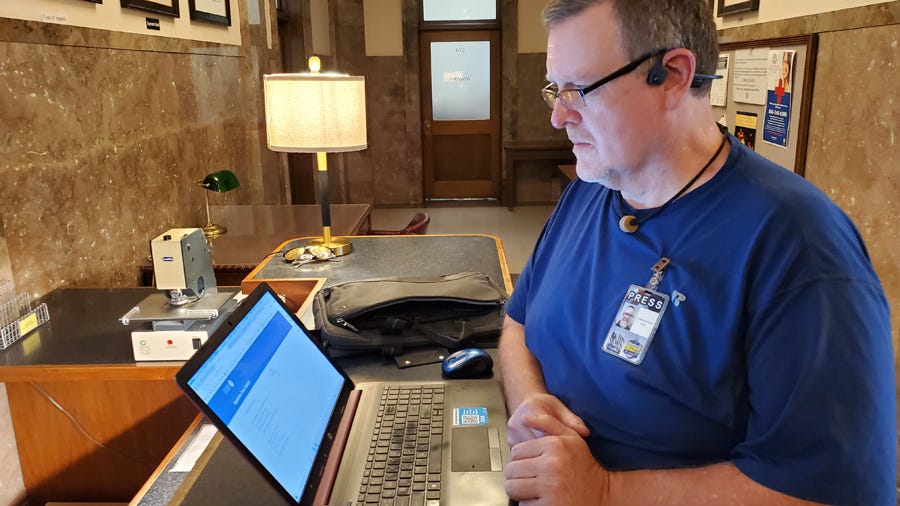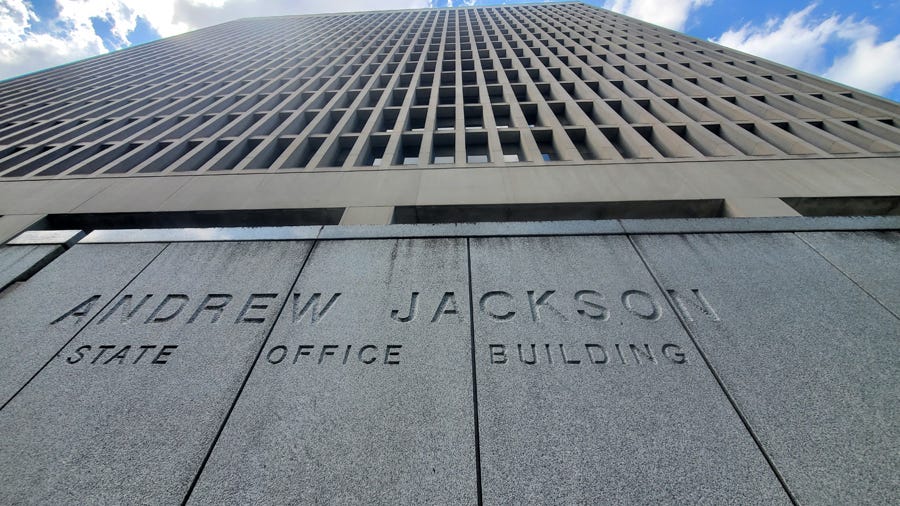Clerk unveils records as Hirsch defies TN justices’ illegal ‘privilege’ tax
We visit supreme court to review record of a case in which state's 5 justices scurry for cover when illegality of their taxing a right comes before them


NASHVILLE, Tenn., Thursday, June 20, 2024 – Supreme Court Justice Roger Page (whom I’m suing but haven’t met) is not in the building, the trooper says.
By David Tulis / TNtrafficticket.us
A carbine shot away, in another building, the state tax boss David Gerregano (whom I’m suing but haven’t met) is in the middle of a meeting with his chief counsel, says a woman at a desk. He's not available, she says.
My visit to Nashville with midstate bureau chief Christopher Sapp is not all dead-ends, however.
We meet Mary Beth Lindsey, the new deputy chief clerk at the supreme court building, who rapidly warms up to us as we press her for details about a twisted judicial operation covering up the justices’ independent tax system that caught the notice of one of the Gnomes.
Mrs. Lindsey says she has no records we can inspect. I indicate as we meet at the clerk’s counter that I have filed two open records request to obtain copies of the file. I am there to personally inspect two files. The case is the appeals record for State of Tennessee v. Arthur Jay Hirsch, nos. M2023-00575-CCA-R3-CD and M2023-00575-SC-unk-CD.
Mrs. Lindsey says the entire record of the Hirsch case is on the court’s website.
Oh? So Mr. Sapp and I sit down at a nearby table and begin looking.
“I’m not getting any younger,” Mr. Hirsch says, indicating he doesn’t know what else he can do in his bid to appeal a case and being denied a hearing on his right to travel, and his right to not be hit with a privilege tax that doesn’t apply to him.
“I can hardly walk. I’ve been doing better the past couple of days. The pain is subsiding and I can move around. Can I spend more and more hours trying to unravel this big knotted-up ball of yarn?”
Hirsch challenge to internal court tax system
Mr. Hirsch of Lawrenceville, Tenn., has been going batty trying to understand what the justices are saying and doing as regards his case. And his challenge to the judges’ screwy and illegal tax machinations under the “privilege” of practicing law. They claim that every person who appeals from a criminal or circuit court into the court of appeals is practicing law and liable to pay a “privilege” tax, as lawyers do, for making appeal, even if the apparel is one of right, and even if they are doing their own law work and not represented by a lawyer.)


Mrs. Lindsey says she has no file or folder I can inspect. The website has everything. Mr. Sapp and I review the files, making note of seven entries to which is attached no PDF.
Importantly, we determine no execution has been issued against Mr. Hirsch and his off-grid residence and homestead in rural Lawrence County midstate.
Mrs. Lindsey, Mr. Sapp and I go over the blank lines to ask why nothing is posted, and whether there is anything we should be able to look at.
“There’s no accountability. There’s no enforcement mechanism against the crooks. They’re determined for this to go no further. It would clarify this issue of privilege. So I think I’m just going to put it in the Lord’s hands. *** I’ll just ride it out.
Mr. Hirsch and fellow gnomes over the past 10 years have determined that much abuse by state and local police and bureaucrats comes from an intentional confusion as to the limit of the state privilege law. The state has only two tax authorities – ad valorem, and privilege.
Hirsch request for hearing
Judges dun Hirsch for payment
The state’s five supreme court justices refuse to respond to his challenge. By law, a challenge to a supreme court rule can be heard nowhere else than this court. It has original jurisdiction. No lower court can hear the grievance.
Mr. Hirsch refuses to pay the tax on two grounds. He is too poor to afford it, and does his own legal work. He is not an attorney, and his appeal from a conviction in Lawrence County criminal court is of right, and cannot be taxed.
The constitution promises that the courts are open, and that justice is not for sale. Mr. Hirsch for many years has insisted on the right to travel by car – apart from any privilege and its implication of commercial, for hire activity. And he insists on his right to conduct private business, and live as a private man on the land.
His legal work and long study, and his many filings, are of the highest quality.
The criminal case he is trying to defend on the merits is also on the question of privilege. How can he be convicted of a “driving” crime while using his car for exercise of rights and private purposes, and not in regulable, taxable activity affecting the public interest, which otherwise would have to be under privilege?



